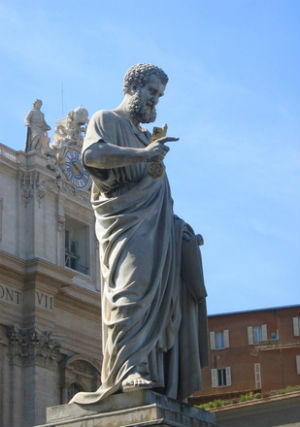
By Neil Earle

I shocked my ministerial group last month when they asked me what I planned to do in retirement.
I blurted out: “Mere Christianity.” I meant that instead of reflecting or defending any particular denomination’s point of view I would have more time to spend on the basics of the faith. The phrase itself of course comes from the prolific thinker, C.S. Lewis (1898-1963). But where might we go to summarize the essence of the faith?
The Apostles Creed would work but even more practically there are St. Peter’s seven “supplements to faith” from his Second Letter. These attributes show Christians how to navigate living as “strangers and aliens” in this sometimes treacherous world.
Blunt Peter sets out in 2 Peter 1:5-7 seven character traits that should come flowing out of people sincerely connected to the Spirit of God. They are “supplements to faith” often called “the Ladder of Virtues.” These are character traits God desires to implant in us that can stabilize and encourage us in our Christian walk. Here they are, with Faith set forth as the leading principle:
“For this very reason, make every effort to add to your faith, goodness; and to goodness, knowledge; and to knowledge, self-control; and to self-control, perseverance; and to perseverance, godliness; and to godliness, brotherly kindness; and to brotherly kindness, love.”
And what are the benefits in developing these specific virtues?
Peter lists them in verses 8-11:
They make us more effective in our Christian witness, more needed now in a time when Christianity is in decline in our part of the world.
They keep us from being unproductive – “all talk and no walk.”
They remind us that we are “trophies” of God’s grace, cleansed for sin to be used in his service.
Actively pursuing them guards against falling into apathy and perdition – the best defense being a good offense.
Let’s examine these “great eight” with the help of the deeper nuances and meanings we find when we look at the original Greek words.
 Arete was often linked with sports in the Greek world.
Arete was often linked with sports in the Greek world.Faith, when transliterated from the Greek reads as “pistis” and it has the basic New Testament meaning of simply being able to depend on God’s promises. The Christian cornerstone is to believe in the saving work of what God has done in Christ, else we have no basis for our Christian lives at all (Acts 16: 31). The Old Testament Patriarch Abraham is called, in the New Testament, ”the father of the faithful.” In Romans 4: 21 it states that Abraham was “fully persuaded that God had power to do what he promised.” It even says in Hebrews 11: 8 that Abraham set out to Canaan from Iraq “and he did not know where he was going.” All he had was God’s promise to beget a great nation, a calling he heartily obeyed.
We are a lot like Abraham as we contemplate our world of worries and tensions. Terrorist threats, house prices collapsing, stock market jitters, health concerns (ours and others), high unemployment – it is an uncertain and fragile world we live in. We just don’t know what the future holds BUT we do know who holds the future! More and more we have to live by faith, the trust that God will get us and our loved ones through. Faith is that evidence available to our minds and hearts, the divinely given confidence, that God will see us through.
Thus pistis begins the Christian life. But more is needed.
Here is where the Greek word “arête” comes in. Translated “goodness” in the New International Version of 2 Peter 1:8 it can also be rendered “good behavior,” a broad application indeed. The expositor William Barclay tells us that “arête” was a term highly prized among the ancients. It was a word applied to the Greek gods. It had the meaning of excellence, courage, something above the average and the mundane. Socrates demonstrated “arête” when he took the poison hemlock rather than go back on his principles, for example. Good behavior refers to walking the walk as well as talking the talk and those with arête can discern between the false and the true.
There are many today who “profess” Christianity (some have their own TV shows) but “arête” turns the light of God’s truth upon them. St. Paul demonstrated moral courage and excellence of character when he announced his firm intention to visit Jerusalem even though the Holy Spirit had clearly shown him that danger lay ahead (Acts 20:22-24; 21:10-11). This kind of sterling dedication to his task was remembered. It strengthened and encouraged the early First Century believers to hang on and endure the savage persecutions of the next two centuries – else there might not have been a Christian church! Of course “arête” can also refer to good works and acts of service. These are displayed all across the early church (1 Timothy 5:10).
Some times arête crops up on prime time television – Mrs. Tuff the black receptionist who talked a distraught young man out of shooting up his school. Lt. Gruter who told an interviewer he prayed three months not to hate his North Vietnamese captor. This is arête, just another way of referencing the Biblical dictum that ”faith without works is dead” (James 2:20).
 St. Peter is not often thought of as having an intellectual side but his Second Letter proves critics wrong.
St. Peter is not often thought of as having an intellectual side but his Second Letter proves critics wrong.Next Peter listed “knowledge.” The Holy Spirit inspired Peter to use a different word for “knowledge” than usual. “Sophia’ is the Greek word for deep wisdom and the ability to make far-reaching decisions based on evidence or sometimes lack of evidence. But in 2 Peter 1:5 the word is “gnosis,” which refers more to “know-how,” how to deal with a tough situation among the host of everyday choices that face us.
Read how Paul the prisoner showed “know how” more than once in the midst of a tempest at sea (Acts 27: 9, 21-42). Paul also exemplified “gnosis” when he lost his temper before the Jewish High Priest but turned the situation to his advantage. As soon as he realized his mistake he tuned on a dime and dug himself out of the hole with a quick apology and quoted a text to turn the tide against his enemies (Acts 23:1-9). This was a good example of know how, of moxie, of “smarts,” of getting oneself out of a jam in a hurry.
How often we wish we had that ability when facing the banker, the creditor, the principal, the false accuser. Saying the right thing and in the right measure – this is something we have to ask our heavenly Father to help us with. But take heart: He is more than willing to do so (James 1:5).
Self-control follows know-how. The Greek word is “egkateia.” It means that reason must always triumph over passion or emotion. Jesus showed “egkateia” that awful night in the Garden of Gethsemane when his human self cried out to escape the horror of the crucifixion. Through a supreme example of submissive prayer Jesus mastered his powerful emotional impulses with perfect self-control and stood up boldly to face what was coming. This is the kind of self-control we all need. One that will help steady us even in the face of death itself.
Greek expert William Barclay claims that the English word “patience” or even “perseverance” is too passive a word to bring out the full meaning of the Greek “hupomone” which comes next on Peter’s list. Hupomone is patience all right but it is patience applied to a desired end. It is not just waiting, it is waiting in expectancy for a good result, and doing so with determination. The Greeks applied it to a plant which could thrive under hard and adverse circumstances. Hebrew 12:2 links it with a firm fortitude that bears up and even thrives under hardship because of an expectation of victory. It is patiently waiting for healing when we are sick, for example, or for the favorable outcome of a dire petition to God. “I wait for the Lord, my soul waits and I trust in his Word” say numerous Psalms. Accompanying such requests is a firm reliance on God’s loving power to be arrayed against the negative circumstances around us.
There is a liveliness and an optimism attached to “hupomone” that will not go down. It is stronger even than our fear of death.
“Eusebia” is the word for the next trait, titled “godliness,” a word not common today, but colorful and robust in that it points out how God’s people are imbued with a sense of calling and commitment that helps them strive for the best as opposed to drifting along with the current. People at work – a boss, a partner, a fellow-worker – may try our patience and even sometimes go out of their way to treat us unjustly or even to trip us up spiritually. But a commitment to godliness means we will react in a Christian way. St. Paul’s words stir us to action in the rough and tumble of life: “Do not repay anyone evil for evil…as far as it lies in you, live at peace with everyone. Do not take revenge, my friend, but leave room for God’s wrath, for it is written; ‘It is mine to avenge; I will repay,’ says the Lord” (Romans 12:17-19).
Now these are some of the hardest words to live up to in the whole Christian Bible. But Paul doesn’t just leave it there. He takes us onto a higher plane of existence, a godly plane, when he says, quoting Proverbs 25:
“’If your enemy is hungry, feed him; if he is thirsty, give him something to drink. In doing this, you will heap burning coals on his head.’ Do not be overcome by evil, but overcome evil with good” (Romans 12:20-21).
Wouldn’t godliness change things in the board room, the cabinet room, the locker room, the living room? Of course it would. Godliness always wins out in the end.
Various New Testament commentaries point out that these two traits are not really identical, though often used carelessly today. “Affection” is the well-known word linked to “philadelphia” – the ability to love all men as brothers. Most of us often extend affection only to people who are just like us. That is a dangerous use of affection for this can lead to cliques, clubbiness, divisiveness and a party spirit which the New Testament deplores. Cliques are bad because they turn inwards and often develope their own inner dynamic, leaving hard shells that bristle when someone tries to break through.
In his famous work, People of the Lie, psychologist Scott Peck showed how some of the greatest evils he encountered were perpetuated by people in self-insulating groups, such as soldiers in battle who felt alone and betrayed and that they must be loyal to each other no matter who gets hurt.
This is a perversion of natural affection. Love, however, the Greek “agape,” is immune to this distortion. Agape breathes the spirit of “all things to all people” (1 Corinthians 9:22). Barclay calls love the characteristic virtue of the Christian faith. ”This agape, this Christian love, is not merely an emotional experience…it is a deliberate principle of the mind, and a deliberate conquest and achievement of the will. It is in fact the power to love the unlovable, to love people whom we do not like…Christian love must extend [even] to the enemy” (New Testament Words, pages 20-21).
This is why love is the foremost of the virtues. This is where Peter’s Ladder of Virtues has led us. Love is always ahead of us, calling us to stretch ourselves, to keep ourselves in check, to turn over and over to our own best instincts and attitudes amid the turmoil of life, to cherish those attitudes that have been bathed in the warmth of God’s precious Holy Spirit.
Thus Peter’s list – we could call them the real Peter Principles – challenges us two thousand years later to live life at its best, to live not for ourselves but for others. And this keeps us fruitful and productive in the Christian life.